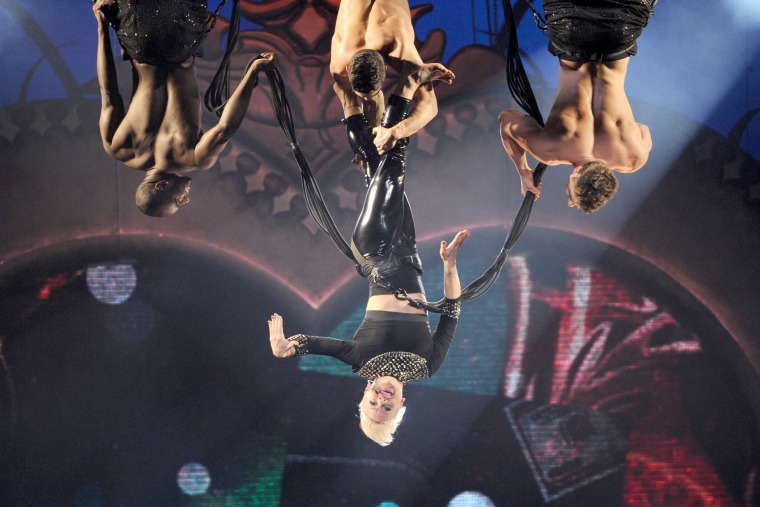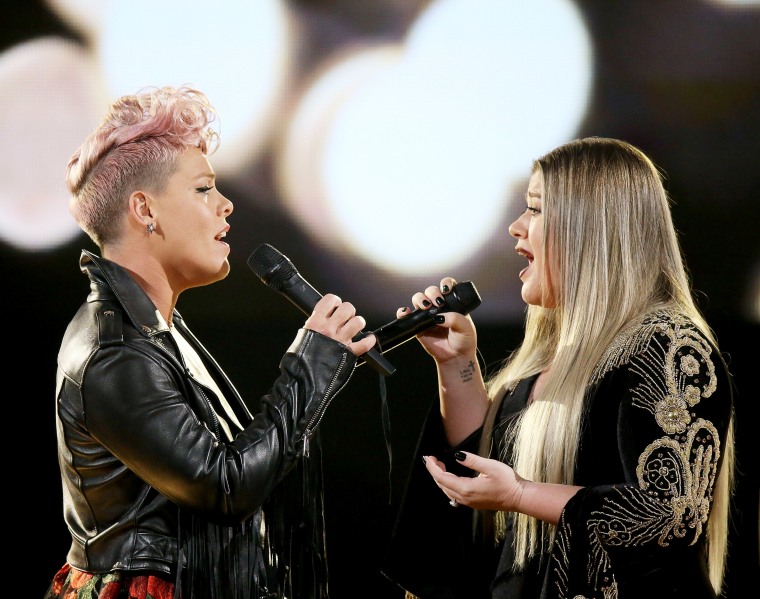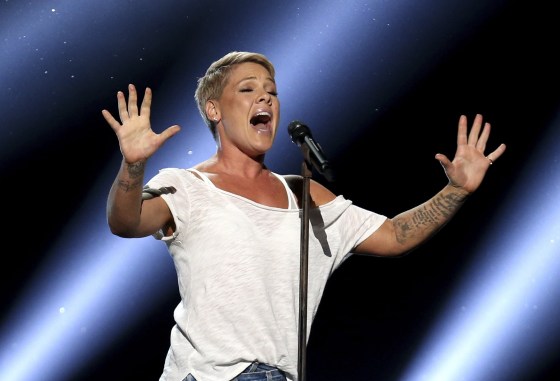When the Philadelphia Eagles punched their ticket to the Super Bowl last month, the pop singer Pink tweeted a keyboard-smash exclamation of excitement at her singing the National Anthem before her hometown team went for their first NFL title — an outburst fully in keeping with the belter's public image, which has blended passion and straight talk since her debut in the early 2000s.
Pink, born Alecia Moore, has been a major pop force for the entire 21st century. (She technically has identified as "P!nk" since her 2000 debut, "Can't Take Me Home.") She's racked up radio hits, like the bouncy "Get the Party Started" and the tender "Who Knew," while honing her live show into a floor-to-ceiling spectacular; her album last year, Beautiful Trauma, had a monster first week, selling 384,000 copies on the way to moving 408,000 album-equivalent units. (Streaming consumption and single-sales tracks made up the rest of the total.)
She's also been outspoken about women's roles, childhood trauma and politics both on records and in the press. Her loose-limbed 2002 single "Don't Let Me Get Me," for instance, got attention for rebuking then-record-company-president L.A. Reid for trying to fit her into the sexy female teenpop world early in her career, but its lyrics also encapsulated a lifetime of not fitting in and what insecurity can wreak: "Doctor, doctor, won't you please prescribe me somethin'/ A day in the life of someone else?/ Cause I'm a hazard to myself," she pleads, her voice cracking on the "else."

Subsequent singles, like the wrenching "Family Portrait" off the same album and the post-breakup power ballad "Sober" from 2008's "Funhouse," also looked at her tribulations — her parents' marital problems when she was a child, her own separation when she was in her late 20s — with searing candor.
And, in 2005 she released "Dear Mr. President," an open letter to then-President George W. Bush that blended hypocrite-exposing pettiness ("You've come a long way from whiskey and cocaine") with pleas for tolerance and empathy; the folk-rock powerhouse Indigo Girls assisted her on backup vocals. And the lead single from 2017's Beautiful Trauma was "What About Us," which blends sleek synthesizers with lyrics advocating for the forgotten. “[Donald Trump's] providing us with rock bottom," she told the Financial Times in December. "The behavior, the mindset that a woman can be grabbed in any way — that mindset is dying. It has to.”
That forcefulness about her political leanings has extended to her choices on collaborators. Last year, Pink spoke with The New York Times about her decade-old decision to cut ties with Lukasz "Dr. Luke" Gottwald, the megaproducer who fellow mononymic pop rebel Kesha accused of emotional and sexual abuse. Gottwald co-produced Pink's spiteful "U + Ur Hand" as well as "Who Knew" — both of which were released in 2006; it was the last time she worked with him.
“But I know that regardless of whether or not Dr. Luke did that, this is his karma and he earned it because he’s not a good person," she told the Times." I have told him that to his face, and I do not work with him. He doesn’t do good business, he’s not a kind person, he doesn’t do the right thing when given ample opportunities to do so, and I don’t really feel that bad for him.”

At last November's American Music Awards, she and fellow Luke-decrier Kelly Clarkson opened the show with a tender duet of R.E.M.'s touching "Everybody Hurts"; while it was billed as a tribute to those who weathered 2017's various man-made and natural disasters, it also felt like a statement of solidarity against Luke and his abuse, as well as the systems that allowed it to persist.
But more important than her politics or her confessional lyrics, P!nk can sing: Her voice is husky yet supple, able to handle wounded piano balladry like the swooning Nate Ruess duet "Just Give Me A Reason," snide pop-rock stomp like "So What" and inspirational anthems like "Fuckin' Perfect." In recent years, the eye-popping spectacle of her televised performances, many of which have involved her showing off her ever-improving skills as an aerialist, have overshadowed the sheer power of her alto; perhaps that’s why, at last Sunday's Grammy Awards, she took the stage solo to sing the determined "Wild Hearts Can't Be Broken."
(In its video, released earlier this week, she throws herself into the song — "There's not enough rope to tie me down/ There's not enough tape to shut this mouth/ The stones you throw can make me bleed/ But I won't stop until we're free" — and, at the end, embraces her six-year-old daughter Willow, who she's raising as gender-neutral.)
It's a bit reductive to call Pink a "survivor" of the teenpop boom, although of the artists featured by TRL in the early part of the century she's had the most consistent career; she's gone from being a representative of adult-contemporary radio's youth boom to one of its most reliable artists, racking up nine No. 1 singles on Billboard's Adult Pop Songs chart since 2007. That steadiness might have resulted in her being overlooked by the meteor-chasers who cover pop music. "I was never as big as Britney or Christina," Pink told the New York Times, adding, "If you look at any paragraph about pop music, I don’t get mentioned — my name doesn’t come up."
Those who don't bring up her name are, unfortunately, overlooking one of the most inspiring pop careers of the last 20 years, and proof that honesty, forthrightness, and tenacity — and, oh yeah, talent — can still take a person far in the music industry.
Maura Johnston is a writer and editor who teaches at Boston College. She has written for The New York Times, The Boston Globe, Time, Billboard, and Rolling Stone.
